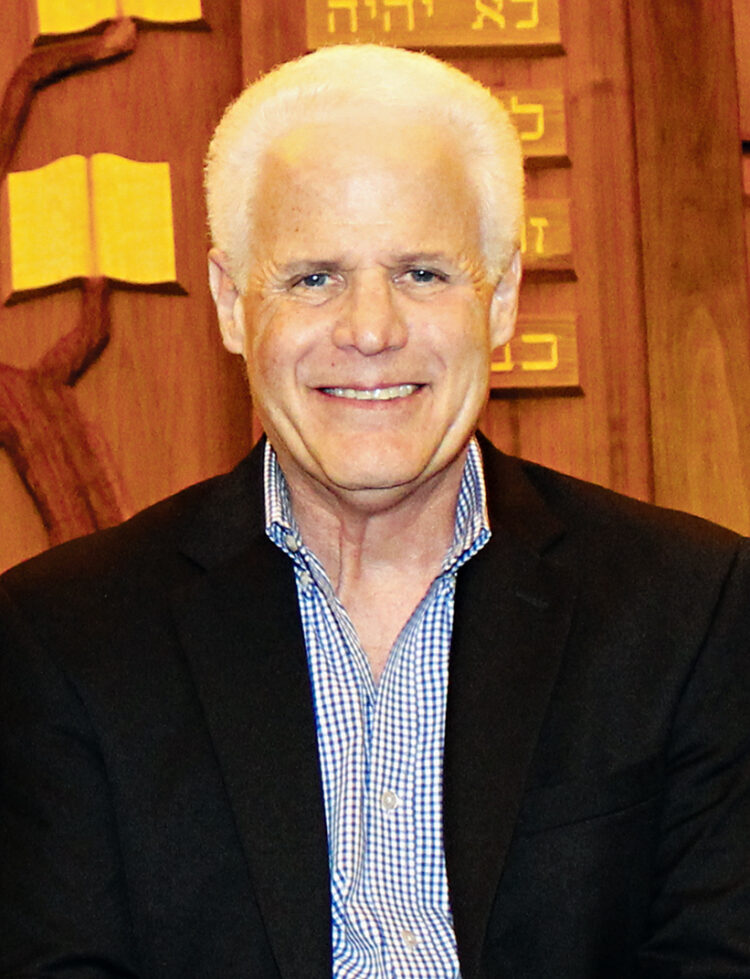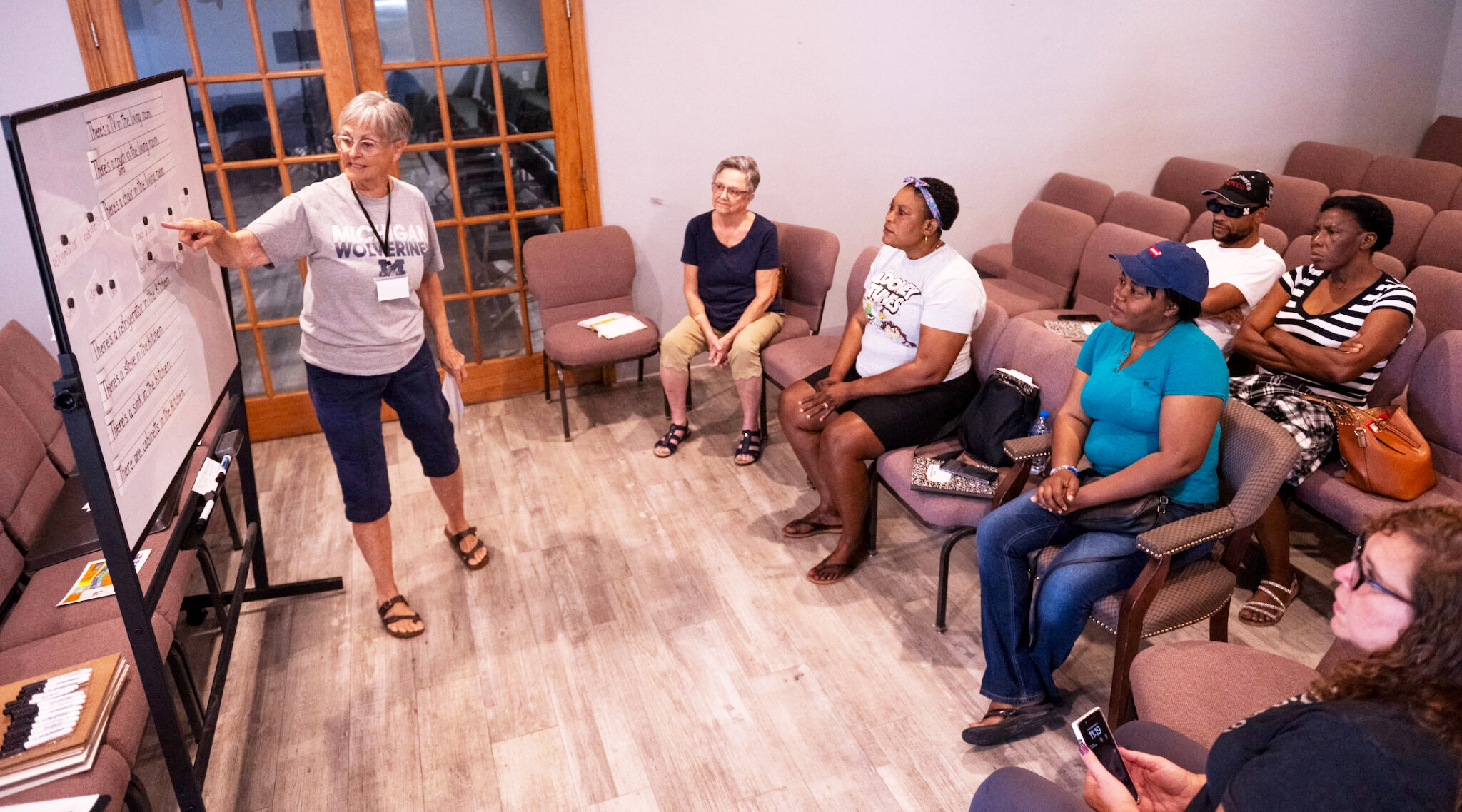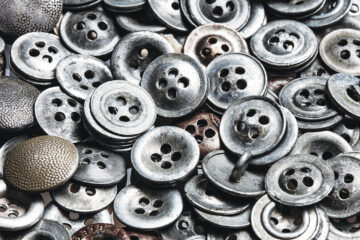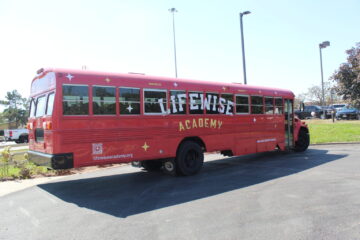The only rabbi in Springfield, Ohio says local Haitian migrants lack ‘Western civilized values’

The rabbi’s comments come as Jewish groups decry Donald Trump’s claims about migrants eating pets.
By Andrew Lapin, JTA
Since Donald Trump amplified baseless rumors about Haitian migrants eating pets in Springfield, Ohio, last week, the community has been beset with bomb threats and white nationalist activity.
A leading Jewish group called the whole episode a “blood libel” — the antisemitic canard that Jews use non-Jewish blood for ritual purposes, which animated centuries of violence against Jews.
But one Jew says the Haitians are harming Springfield: the city’s only congregational rabbi.
“This is about a culture clash,” Rabbi Cary Kozberg, who leads Temple Sholom, told the Jewish Telegraphic Agency. “We, as the citizens of Springfield, are being disenfranchised.”
Like Trump, J.D. Vance and others who have taken aim at Springfield’s immigrant population, Kozberg says he believes the new arrivals — most of whom are in the country legally — are changing the city’s character for the worse.
“Haiti is not known for its, shall we say, adherence to Western civilized values,” Kozberg said.
The comments might sound jarring coming from a rabbi ordained by the Reform movement. Reform Jewish congregations and rabbis have been among the most outspoken opponents of Trump’s anti-immigrant rhetoric and policies stretching back across the more than nine years since he entered politics. During Trump’s presidency, Reform Jews protested against his travel ban on Muslim-majority countries, rallied across the United States in support of refugees and lobbied to support “Dreamers,” young adults who as children were brought to the country illegally by their parents. Many cited their own families’ immigrant histories as a reason to oppose Trump.
But not all Jews connected to the movement share that worldview. And Kozberg, who sits at the epicenter of an anti-immigration firestorm, is among the dissenters. He says he doesn’t think American Jews’ immigrant forebears are comparable to the Haitian migrants in Springfield.
“When Jews came here, they wanted to assimilate, they wanted to be good Americans. In fact, they jettisoned a lot of their own Jewish background to become good Americans,” Kozberg said. “That’s not necessarily the case with these folks, and that’s where a lot of the frustration is.”
Kozberg spoke to JTA about a week after Trump vaulted into the national consciousness a conspiracy theory that had already percolated online for months and hastened right-wing antipathy toward Haitians in Springfield.
“In Springfield they’re eating the dogs, the people that came in. They’re eating the cats,” Trump declared during his debate with Vice President Kamala Harris on Sept. 10. “They’re eating the pets of the people that live there. This is what’s happening in our country.”
Trump was repeating an idea that took off after a Springfield woman posted on social media that she believed a neighbor’s pet could have been eaten by Haitian migrants. (The woman has since deleted her post and recanted it.) The post began circulating on Telegram and other platforms used by far-right extremists, some of whom had already begun condemning the Haitian influx to Springfield after a migrant caused a traffic accident that killed a local boy last year.

In August, members of the neo-Nazi group Blood Tribe waved swastikas as they marched through downtown Springfield and were ejected from a city council meeting for spreading hate speech; one speaker identified himself as having been at “the head of the anti-Haitian immigration march earlier this month.”
Local leaders say the influx of 12,000 to 20,000 Haitian migrants has put real pressure on their city of 60,000. Schools, health care and social services are all being taxed, and the city’s costs are rising. But they have firmly rejected the idea that anyone is eating pets.
Still, Vance, the Ohio senator and Trump’s running mate, has amplified the rumors even while admitting they are baseless. And when Trump made his comments during the debate, an estimated 67 million Americans were tuned in.
Since then, the town has been beset with bomb threats, visits from the Proud Boys, a violent far-right group, and “Haitians Out” fliers bearing the insignia of white supremacist groups. Schools, hospitals and a cultural festival in Springfield have shut down or canceled activities over threats of violence; a planned local political debate was postponed.
Kozberg says he has no evidence that the pet rumors are true. And like Mayor Rob Rue, he said he’s unhappy that Trump’s repetition of them has thrust Springfield into the spotlight. After being told the pet-eating accusations were baseless, he said Vance was pursuing a “bad strategy” by continuing to spread them.
“I feel frustrated,” he said. “And I feel the need to educate my fellow Jews that Jewishly, we should be addressing this in a Jewish way, and not the way other people are.”
He explained, “From a Jewish point of view, things are never black or white.”
The rabbi said he would still vote for Trump in the fall. He firmly believes that the influx of Haitian migrants has harmed his community, including members of Temple Sholom, some of whom he claimed had been forced to move out of their apartments because “the Haitians were trashing the complex.”
Members of the synagogue declined to speak with JTA, including its president, who — in a message via an intermediary — cited fears of retribution from hate groups.
“Another congregant was injured in a car accident because Haitians don’t drive the way we drive here in this country,” Kozberg said, repeating an attack line on Haitian communities that right-wing media outlets have also spread in recent days.
Kozberg’s attitude toward migrants is part of his overall right-wing outlook. He’s also an outspoken advocate of gun ownership, believing firearms are necessary for Jews to defend themselves. In 2020 he recorded a video message for the Republican Jewish Coalition in which he said Trump “has done more for Israel and the Jewish people than any of his predecessors,” and charged that “the religion of many American Jews is no longer Judaism, it’s progressivism.”
Those opinions put him out of step with the vast majority of Reform Jews who, polls show, vote for Democrats. It also puts him out of step with his synagogue’s movement, which has lobbied for gun control and immigration rights.
Some in the movement say it is incumbent on rabbis to reject the rhetoric spreading about Springfield.
“The lies being spread about the Haitian migrant community in the U.S. are not only absurd, but deeply dangerous. Political leaders, community leaders, and faith leaders – including rabbis – have an obligation to push back,” Rabbi Jonah Pesner, director of the Religious Action Center of Reform Judaism, said in a statement to JTA. “As Jews, we are all too familiar with the danger of spreading conspiracy theories about minority groups. We condemn it and urge others to do the same.”
Other Jewish leaders have made similar arguments. Mark Hetfield, CEO of the Jewish refugee aid group HIAS, said the anti-Haitian invective was “a new brand of blood libel.” HIAS has issued a joint statement with the Jewish Council for Public Affairs, a progressive group, and two other groups denouncing Trump’s rumors about Haitians.
“It is ironic that this libel against Haitian immigrants coincides with the 100th anniversary of the Johnson-Reed Act, where Congress legislated drastic immigration quotas largely motivated by antisemitism and a belief that Jewish immigrants were unassimilable,” Hetfield told JTA, referring to the 1924 legislation that all but ended Jewish immigration from Eastern Europe.
Hetfield, who said he worried that Haitians could be the target of a violent attack, added that Jews should “demonstrate support for immigrants because we were once in their position. We should naturally be expressing solidarity. Especially because they’re being maligned on the basis of a lie.”

Kozberg rejects that argument. Located in the historic heart of the movement’s American center, Temple Sholom has been affiliated Reform since 1873. But despite his longtime relationship with the synagogue and his current role as its part-time rabbi, Kozberg no longer personally identifies with the Reform movement, seeing it as ideologically mismatched with his views.
“I was taught that to be a good Reform Jew, one had to advocate for social justice, which usually translated into supporting Democratic or progressive candidates and issues,” Kozberg told the RJC in the pro-Trump video message in 2020. In a recent essay titled “The Reform Movement Left Me,” he elaborated on his objections, writing that in Reform Judaism, “The age-old, honored rabbinic methodology of discussion and debate to learn and deduce holy behavior is no longer encouraged.”
To JTA, he said, “I’m not really affiliated with the movement anymore. Because its agenda is so political, and there’s not much room for people of my political persuasion. It didn’t used to be that way, but it is now.”
Today, Temple Sholom has a small membership, a familiar story among synagogues in mid-sized cities with dwindling Jewish presences. It currently has about 30 member households, and the youngest members are in their late 40s. Kozberg himself lives in Columbus, 50 miles away.
While some faith communities in Springfield are turning out to support the local Haitians, including by going en masse to eat at Haitian restaurants, the synagogue has not been active on the issue.
That surprised Marshall Weiss, editor of the Dayton Jewish Observer, who will now be exhorting local Jews to action.
“If you live in Springfield, have you made your voice heard civilly in public forums?” he wrote in a column that will appear in print in October’s edition and was shared in advance with JTA. “At this time, when Springfield is under the world’s microscope, and as its problems appear insurmountable, the words of the Prophet Micah come to mind of what the Almighty requires of us: ‘Only to do justice and to love goodness, and to walk modestly with your God.’”
But Weiss said he understood that Springfield’s Jews might interpret that edict in a range of ways.
“In Springfield it’s not ‘This is what the Jews think, this is what the Jews feel,’” he told JTA. “It’s a small community and everybody has a different perspective and viewpoint.”
Indeed, Kozberg said his views are not shared by everyone in his congregation, which he described as both ideologically and denominationally diverse. He also said he always cites Jewish texts to support his political views — and that his understanding of the Jewish commandment of tzedakah, or charity, is relevant in the current moment.
“Tzedakah is about concentric circles,” he said. “If other people are helping the Haitians, God bless. I’m not saying they shouldn’t be helped. But I think there needs to be a focus on the folks that have been disenfranchised by what’s going on.”
Asked which communities he believes have been disenfranchised, Kozberg clarified that he meant “white, Anglo-Saxon Protestant” people. He added, “Certainly from a Jewish point of view, we don’t only help the stranger, but we have to take care of the people who are neighbors.”
Asked to respond to the claim about charity, Pesner, the Reform leader, also cited the Torah. “The most oft repeated commandment in the Torah is to welcome the stranger. Not your loved one, not your neighbor, but the stranger,” he wrote. “At times when it is hardest to see what connects us, the Torah reminds us we are all God’s children.”
Kozberg sees another relevance to the current moment in Jewish text: He compares Trump and Vance to the Biblical figure of Yiftach, or Jephthah, a judge who became a leader of the Israelites and who, notoriously, had to sacrifice his own daughter after making an ill-conceived promise to God.
“What came out of his mouth got him into a lot of trouble, but he was the person that was needed at the time,” the rabbi said.
Despite his passion for Jewish self defense and security (he has encouraged Jews to own guns and enlist in the U.S. military), Kozberg told JTA he is not particularly concerned by the current local threats from white supremacists, which he claimed are “coming from overseas” — a claim Ohio’s Republican governor has backed up. He is more worried, he said, about radical Islam.
Like many synagogues, Temple Sholom has bolstered its security in recent years following attacks on several U.S. congregations. During Rosh Hashanah services two years ago, Kozberg recalled, a stranger “obviously of Middle Eastern background” had sought to enter the building, claiming he was Jewish. The man was driving a truck, which Kozberg feared could contain explosives. When the man failed to answer what Kozberg said were “some basic questions” about Judaism, the synagogue’s staff asked the man to leave and called the police.
He said, “We have a sign on the door that basically says, ‘Welcome, but if you are unfamiliar to us, you will be subject to a search.’”





